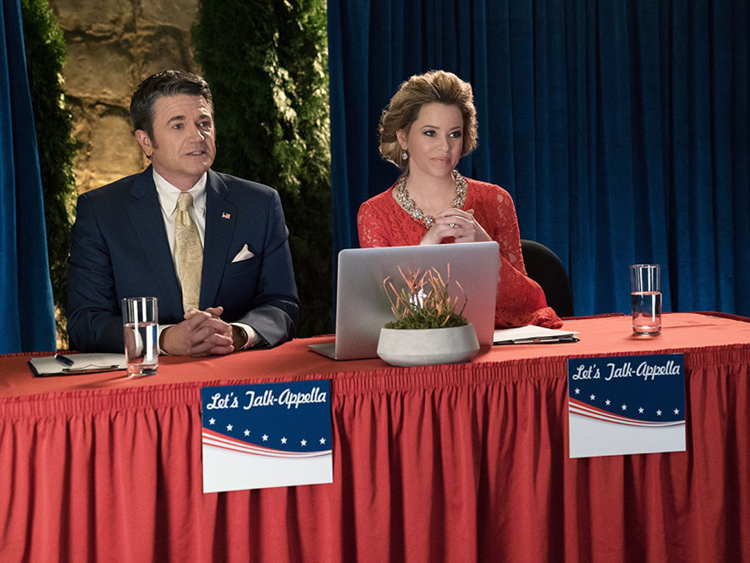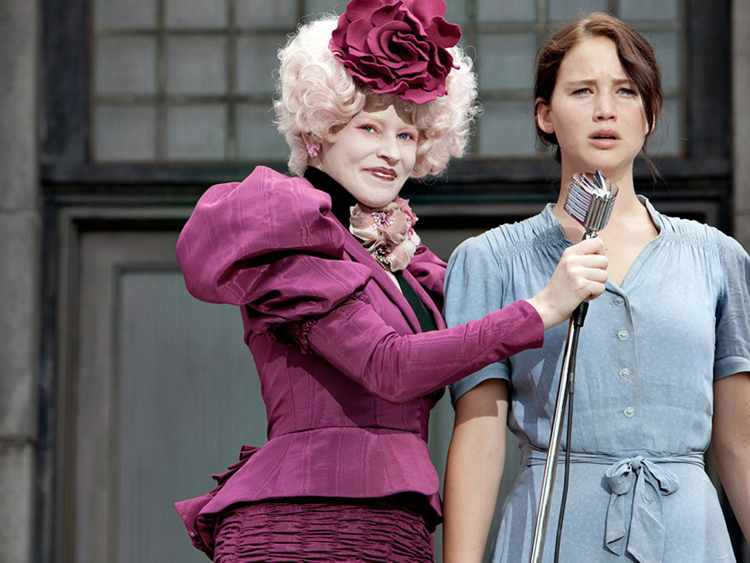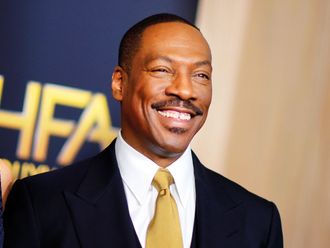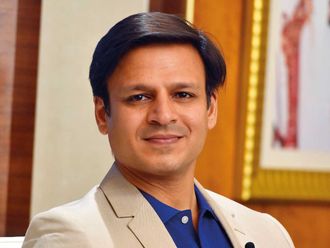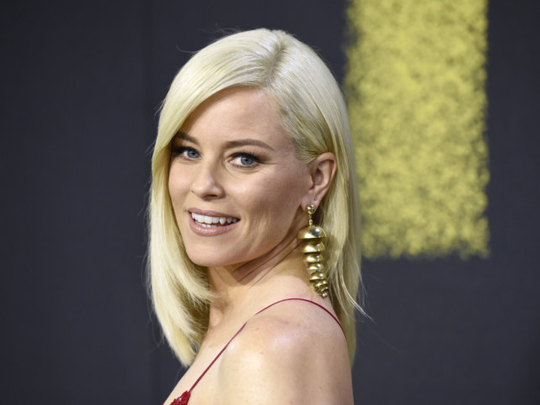
Elizabeth Banks doesn’t mince words. Why bother, when you’re trying to get things done? Sitting in her office, in a bungalow on the Universal Studios lot, the platform heels she wore for a photo shoot replaced with black oxfords, Banks, 43, was no-nonsense when asked why she transformed herself from a comic star into a producer and director.
“I was a frustrated actress,” she said. “I was bored.”
Now she is busy. Brownstone Productions, the 10-year-old company she started with her husband, Max Handelman, has development deals with nearly every major studio, and projects percolating for film and TV. She’s a founder of WhoHaha, an online platform for female comedians. And she’s still performing, most recently playing herself as Larry David’s girlfriend on Curb Your Enthusiasm. Another instalment of her as Gail, the sweetly vicious a cappella commentator, arrived Friday with Pitch Perfect 3; Brownstone developed and produced the Pitch franchise.
Banks’ hat-trick — actress, filmmaker, business maven — remains rare for women in Hollywood, where she has quietly become an industry force, even while audiences mostly know her as the gaudy Effie Trinket in The Hunger Games. Her directorial debut, Pitch Perfect 2 in 2015, was made for a reported $30 million (Dh110 million) and opened at No. 1, grossing more than $280 million (Dh1 billion) globally.
By outperforming expectations, it instantly put her in a league with very few women (and leapfrogged some men). She’s now on deck to direct and produce a new Charlie’s Angels film for Sony, from an idea she conceived.
That many of her coming projects focus on women is equal parts feminism — “I’m fighting the male narrative in all of our lives,” she said — and expedience. When selling ideas, she said, “you’re always looking for yes. It’s easier to get yes, when you’re a woman, if you work on female-led films.”
At a moment when the entertainment industry is unmoored because of sexual misconduct allegations, the ascendance of a woman whose films primarily revolve around women feels providentially well timed. Still, Banks’ accomplishments will be measured not just in social change but also in money.
“She gets that to really change the status quo, you need commercial success,” said Donna Langley, the chairman of Universal Pictures, the studio behind Pitch Perfect. “Liz is a real business-person.”
Langley gave Banks the green light to direct the sequel, and the studio has an overall movie development deal with Brownstone; in the autumn, it optioned the children’s bestseller The Paper Bag Princess as another potential directing and producing vehicle for her. Under Brownstone, Banks also has a TV deal with Warner Bros. and has sold a pilot starring Laverne Cox as a fake psychic to ABC.
Her philosophy for success producing in Hollywood, she said, was three-part: access (which she has as an actress), taste (hers skews more mainstream than indie) and clout (which she earned after Pitch Perfect 2).
Her friend, Melissa McCarthy, said Banks “has a good bird’s-eye view of the world and this industry. She’s a realist.” They met and hit it off when McCarthy’s husband, Ben Falcone, starred with Banks in What to Expect When You’re Expecting.
“There’s such an assertive quality to her, and I mean that in the greatest possible way,” McCarthy said. “She’s like some old studio exec from 1942 — her in a suit and cigar would make perfect sense. Ben always calls her the Mogul.”
An old dream
The daughter of a bank employee and a General Electric factory worker, Banks grew up in Pittsfield, Massachusetts, the eldest of four. “I said I grew up poor once, and now my parents are upset with me,” she said. “So I grew up middle class. Very hardworking parents, who did a great job providing for us.”
Still, she and her best friend fantasised about a ritzier life on the other side of town, far from her family’s duplex on Brown Street. “The big homes always had five-number addresses, and they didn’t have a dirty colour as the name of the street,” she said. “In our fantasy, you didn’t live at 101 Brown St. You lived at 10-100 Brownstone Drive.”
Naming her production company Brownstone, Banks said, recalled those aspirations. Banks, who attended the University of Pennsylvania on grants and financial aid, was the first person in her family to earn a college degree; she graduated magna cum laude and met her husband on her first day there.
The end of Romcoms
When she arrived in Los Angeles, equipped with drama training from the American Conservatory Theater in San Francisco, she had clear goals. “I came to be Julia Roberts,” she said. “And they stopped making romcoms the minute that I got here. I have literally fallen in love exactly one time in a movie.” (That was Walk of Shame in 2014.)
In 2001, she landed a breakout part in Wet Hot American Summer, which led to more comedies, but soon enough she saw that the career she’d imagined for herself wasn’t going to materialise. “The types of movies and the roles that I thought I would be playing, they didn’t exist,” she said. “They’re not making female stars. I’m not turning into Reese Witherspoon.”
Road less travelled
Banks said she took an informal inventory, talking to actresses she admired — Laura Linney, Frances McDormand, Diane Lane, Julianne Moore — to figure out a future she wanted. “I felt underused,” she said. “I just knew there was more for me to be doing.”
Their insight — that the best roles for women often came in indie films that paid little, were a struggle to get made and sometimes took you away from your family to lacklustre locations — made her realise, she said, that she wanted a different route, especially as she and Handelman were contemplating parenthood. (They now have two boys, ages five and six.) Artistic fulfilment, she felt, shouldn’t have to come at the expense of autonomy. “There just became a moment where I was like, I need more control over all of this,” she said.
“I also like money, and that is OK,” she added. She was aiming for a home where her children would not have to share a room. (The other actresses’ counsel: “It’s actually OK to want money in the way that your male colleagues want money.”)
The first film Brownstone developed was Surrogates (2009), based on a graphic novel and starring Bruce Willis. Then came Pitch Perfect, from the book by Mickey Rapkin, which tracked the first all-female a cappella team to make it to an international singing championship. Banks had encountered the a cappella scene at Penn.
“I remember this guy singing Elton John’s Rocket Man and really moving me,” she said. “Max was like, ‘Do you remember how nerdy but committed the a cappella kids are?’ That a cappella would be a nerd’s greatest outlet just seemed like a really funny idea to us.”
The first film, with a modest budget and a newly-famous Anna Kendrick in the lead, was a surprise hit in 2012 and created a star turn for Rebel Wilson as Fat Amy. Banks gave Wilson a bigger role and a boyfriend in the Pitch Perfect sequel.
“As an actor, Elizabeth has the unique ability to see the whole movie, not just her own part, which is why it’s not surprising she has turned into such a good director,” said Gary Ross, who directed her in Seabiscuit and The Hunger Games. Banks hung around the monitors on set, asking questions, as she prepared to direct, and started out by making a public service announcement for the American Heart Association.
Her other revelation came courtesy of research by the Geena Davis Institute on Gender in Media and other institutions, which highlighted how underrepresented women were in front of and behind the camera.
“It told me that I was not the problem,” Banks said. Her castmates from Wet Hot American Summer — Amy Poehler, Paul Rudd, Bradley Cooper — all went on to big careers, but the men scaled quicker. “I’d be like, what’s going on? One of them is a Marvel superhero now, and I can’t get a small role in an indie,” she said. Rudd (Ant Man), a friend, gets “70 per cent more at-bats than I do.” She also noted that “there’s a lot of material that stars men between the ages of 20 and 50. There is not that amount of material for all of us actresses.”
“It was a great epiphany,” she said.
Witherspoon had a similar awakening recently and started a production company for female-led projects, finding success with Gone Girl, Wild and Big Little Lies. Banks is focused more on comedy.
She realised she was funny in college and drama school. “I found it was always riskier and felt more dangerous to land a joke than to start crying,” she said.
McCarthy, her castmate in the forthcoming puppet film The Happytime Murders, recalled a scene in which Banks plays a live-action character who becomes an adult dancer. She does a pole dance for puppet rabbits and came in with some moves she cribbed off YouTube. “She’s onstage dancing with this carrot peeler, throwing carrot peels on these rabbits,” McCarthy said, cracking up at the memory. “She’s a such weirdo — lovingly I say that, from one weirdo to another.”
Banks has no plans to stop acting, but she’s also not drumming up leading roles for herself: “How many blockbuster movies are being made about women who are in their 40s?” (She counted two in 2017: Girls Trip and A Bad Moms Christmas.)
“I have made a career out of being splashy in smaller roles anyway,” said Banks, who’s been nominated for three Emmys, for guest performances on 30 Rock and Modern Family. “It’s sort of my comfort zone.”
In Pitch Perfect 3, which was directed by Trish Sie, the Barden Bellas singing group joins a USO tour, inspired by Banks’ own experience with the organisation in 2015. (“I am self-aware enough to know that not everybody who I meet on the USO tour is going to know who I am. They were like, ‘Yeah, Cher came last month’.”)
Her vision for Charlie’s Angels — the cast shortlist reportedly includes Kristen Stewart and Lupita Nyong’o — is of an international crime-fighting syndicate with a feminist bent. In this era, she added, “we don’t have to apologise for kicking a man’s butt.” This one, she’ll act in.
“I am very ambitious for the project,” Banks said. “I am down for go big or go home.”


